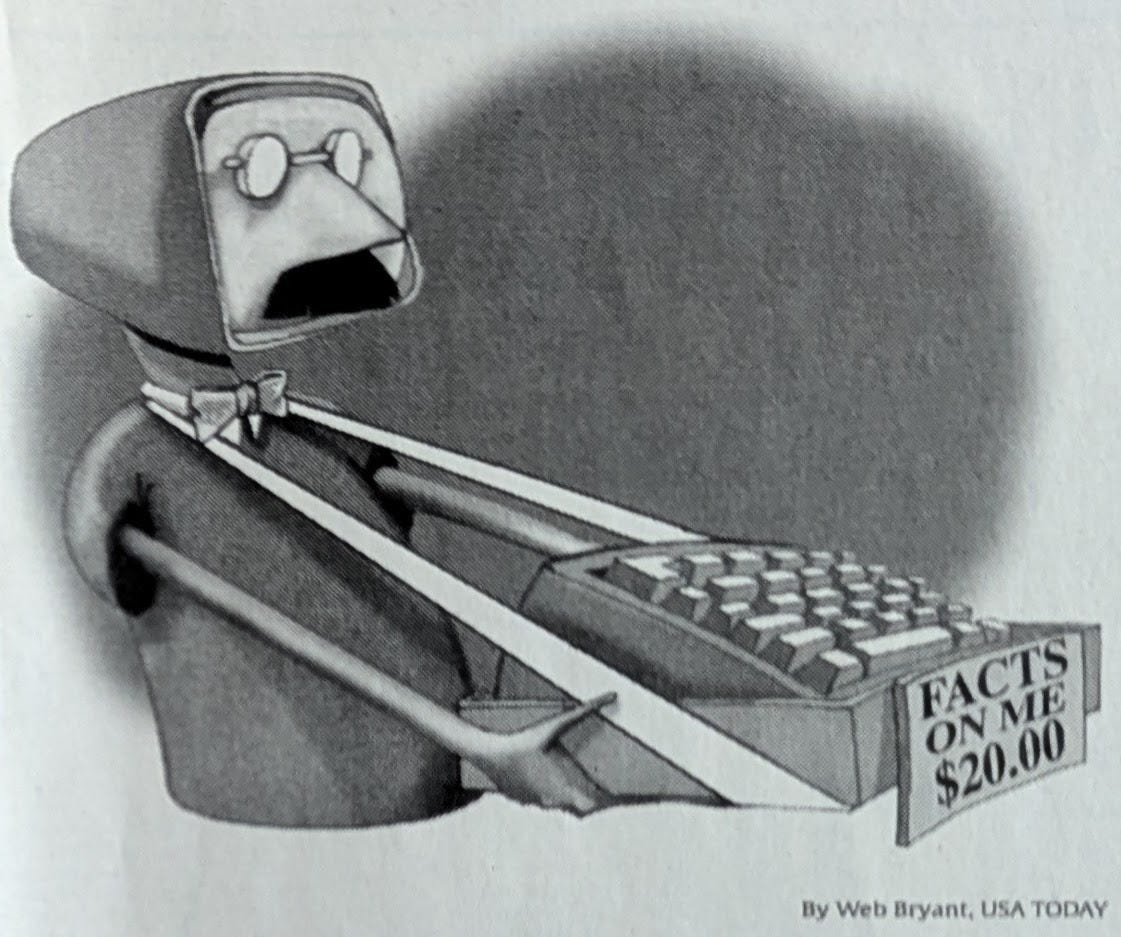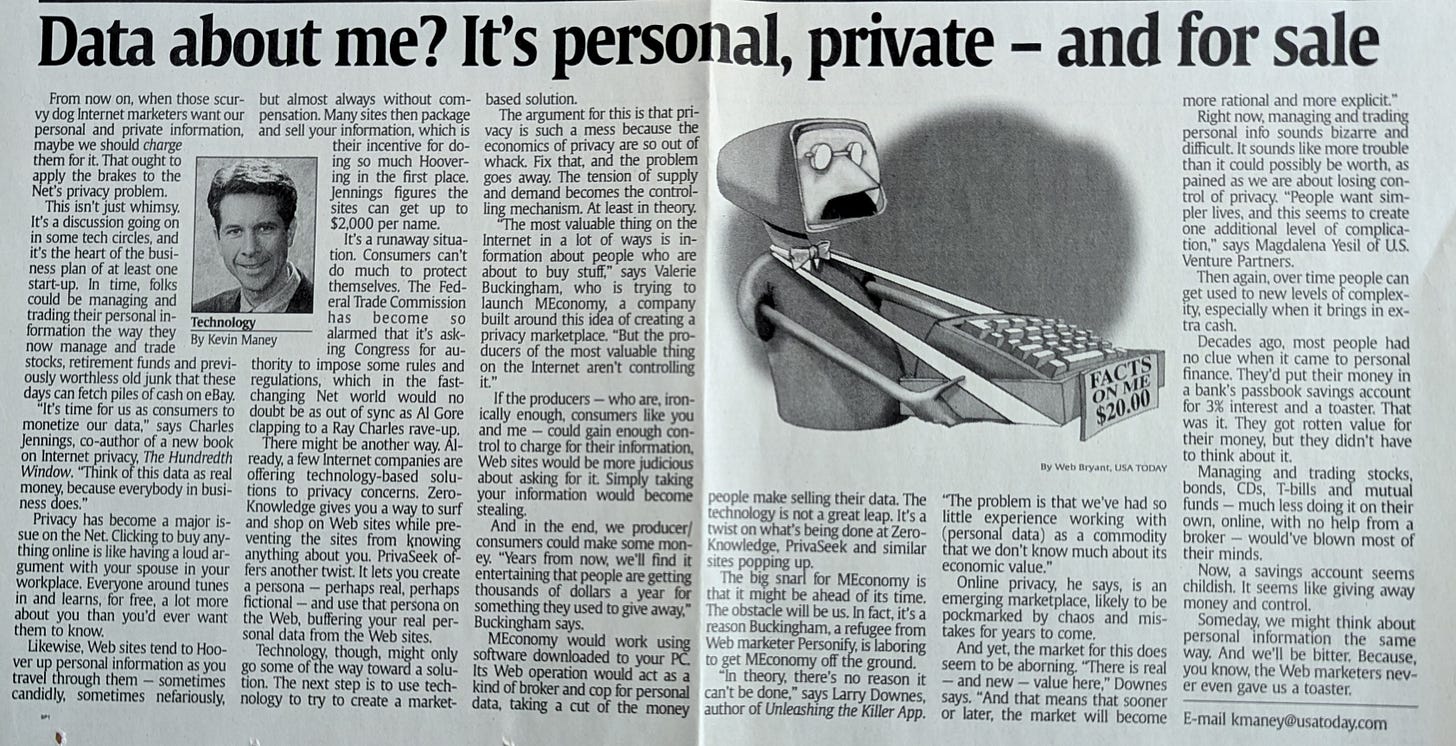25 Years Later, I’m Still Not Right
But, finally, we might want to monetize our personal data…or not
Searchin’ on the Internet looking for love
Screens and screens and screens just keep popping up
Blue cheese, chopsticks, motor oil, French fries
Damn thing knows whatever I’m gonna buy
That’s the first verse of a song titled “Privacy” that I wrote in 2006 and recorded in 2007. I also found a column I wrote in 2000 – nearly 25 years ago – about the idea that people should be able to control, own and sell their personal data, vs. giving it away to web sites.
Throughout these past 25 years, piles of companies have popped up to solve the problem of owning and monetizing our personal data, yet none have gotten traction, most have disappeared, and I don’t know a single person who controls and monetizes their personal data.
In my work with Category Design Advisors, we’re helping a startup right now that’s trying, again, to offer a solution to this personal data issue – this time using AI and other new tools. And it’s not the only new company out there chasing the same problem. This issue has been like watching all the ghost hunter shows pop up on TV. So much time and effort gets spent never actually catching a ghost.
So, you gotta wonder, if a lot of really smart people have been working on this widely discussed problem for a quarter century and no one has nailed it – how come?
I don’t think the issue is a failure of technology or business models. I think it’s this simple: nobody has been able to make most of us care enough to do anything.
It’s like Al Gore setting off alarms about climate change in 2006 and the populace shrugging their shoulders and saying, “Ah, I see your point,” and then going out to buy Hummers.
Here’s the issue as I wrote about it in 2000, quoting Valerie Buckingham, who had recently started a (now long gone) company called MEconomy. “The most valuable thing on the internet in a lot of ways is information about people who are about to buy stuff. But the producers of the most valuable thing on the internet aren’t controlling it.”
Which was true then and is still true now. I continued in the column:
If the producers – who are, ironically enough, consumers like you and me – could gain enough control to charge for their information, web sites would be more judicious about asking for it. Simply taking your information would become stealing.
And in the end, we producer/consumers could make some money. “Years from now, we’ll find it entertaining that people are getting thousands of dollars a year for something they used to give away,” Buckingham says.
By “years from now” she didn’t know she meant, like, in 2030 or 2050.
Yet, if anything, our personal data has become more valuable than ever. And we still don’t get paid for it.
Technology-wise, it’s entirely possible for us to wrap our data – our names, search queries, shopping habits, friends, movie preferences, professional activities and more – in a protective shield as we move through the internet so that web sites and advertisers can’t see it without our permission.
We could choose to sell that permission, with limitations that we set, to web sites and advertisers. They’d buy it in order to better target each of us – in Buckingham’s words, so they could know who is about to buy stuff, and what they are looking for.
It makes sense, but it also adds complexity for consumers. It’s kind of like going from the days when you’d plan a vacation by just walking into a travel agent’s office and telling them where you want to go, vs. finding and booking your own flights, hotels, tour guides and whatever else. Except that we’ve embraced that complexity around travel.
That suggests that adding complexity may not be the real barrier. Instead, the barrier seems to be a deal with the devil we all made long ago – the devil most significantly presenting itself in the form of Alphabet and Meta.
The deal: Alphabet and Meta “buy” our data by giving us free stuff. Google search, Gmail, Google Maps, Calendar, Facebook, Instagram, WhatsApp – we find these to be incredibly valuable services, and we get them for FREE!
At least we feel they are free because we don’t actually feel like we lose anything when they siphon off information about us.
It’s a little like free parking on city streets. We all own the streets, so why don’t we get upset when those who own cars get to store them there for free? Probably because we don’t feel like letting them do that costs us anything, even though it does. We’re content to give away what should be valuable space.
The irony is that it’s our data that makes Alphabet and Meta two of the most valuable companies on earth. They learn about us, then sell that information to advertisers that desire to know what we want to buy and when we want to buy it. Those advertisers then improve their profits by selling more stuff with less advertising, thanks to the ads being so targeted. The valuable information we each produce just rolls through the economy adding value to everyone down the line.
And for that, we get Gmail and Instagram.
Oh, and if I were Alphabet and Meta, if consumers started cutting off their data and charging for it, I’d turn around and start charging consumers to use Alphabet and Meta stuff. Would we come out ahead in that trade-off? Hard to say. Alphabet could extort a hell of a lot from me to keep my Gmail account going.
However, I’m old. Al Gore couldn’t get my generation super fired up about climate change, but newer generations are all over it. They are motivated to do something. Similarly, a new generation could very well adopt a very different attitude about their personal data.
They seem to care less about the free digital drugs that Alphabet and Meta serve up. Google search? They’re increasingly going to AI chatbots, which may be training on their inquiries but aren’t taking personal information to sell to advertisers. (At least not yet.) Instead, the chatbots, such as ChatGPT, are getting users accustomed to paying a subscription fee.
Social networking? More and more young people are finding them toxic and intrusive. And more and more would rather text curated groups of friends.
Gmail? Who out there of my generation now has to text their kids to get them to see an email you wrote them because otherwise they’d never look?
So I think there’s a chance upcoming generations will be happy to unwind the deal with the devil and instead want payment for their highly-valuable, worth-protecting personal data.
It took 25 years to get here, but could we be close to people realizing they don’t want what I wrote in the last verse of “Privacy”?
Credit cards, Web sites, ATMs, cell phones
Insurance claims, catalogs, your tab in a barroom
Data data data somehow adds up to me
Now they can predict whenever I’m gonna pee
—
This is my column as it ran in USA Today on May 31, 2000. It’s not available online.





